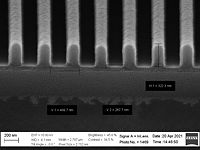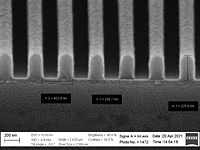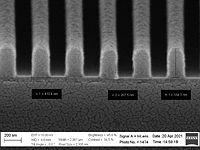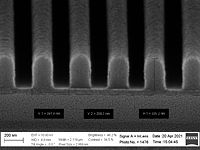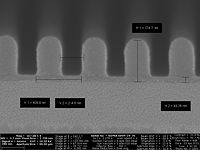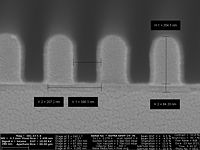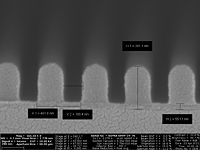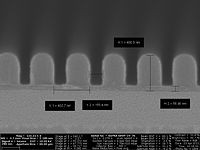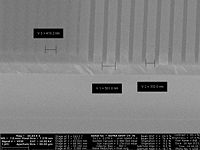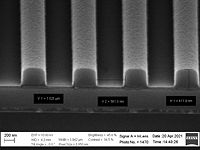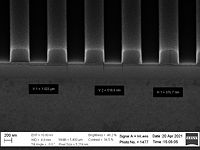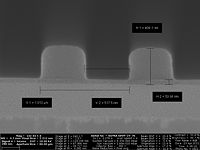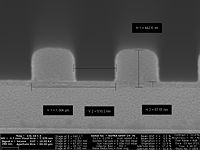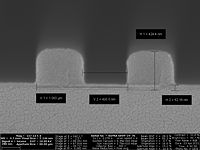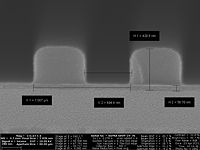Specific Process Knowledge/Etch/DRIE-Pegasus/Pegasus-4/SiO2 Etch: Difference between revisions
Appearance
| Line 29: | Line 29: | ||
First I need to make sure that the resist work for pattering the aSi layer is good. If the resist is not good the final etch will also not be good. | First I need to make sure that the resist work for pattering the aSi layer is good. If the resist is not good the final etch will also not be good. | ||
==DUV optimization== | ===DUV optimization=== | ||
Dose test with the doses (J/m2): 200, 210, 220, 230, 240, 250, 270, 280 | Dose test with the doses (J/m2): 200, 210, 220, 230, 240, 250, 270, 280 | ||
The aim was to get good line for 400nm pitch/200nm lines | The aim was to get good line for 400nm pitch/200nm lines | ||
Revision as of 15:18, 1 December 2022
SiO2 Etch using resist as masking material
I am in the process of doing some development of a SiO2 etch. So far I have found this fairly good recipe. For now it is the standard SiO2 etch recipes but I might change the "Standard recipe" a a later time if I find a better one. You are welcome to contact me see more result. I will add them to Labadviser at a later time. /Berit Herstrøm bghe@dtu.dk (Nanolab)
- Recipe name: SiO2_res_10, Recipe no. 10: C06445_02 coil_2500W, platen:300W, He/C4F8= 17.5, C4F8/H2=1, Pressure:8.8mTorr, C4F8:25.6sccm, He:448.7sccm, H2:25.6sccm, 3:56 min
-
0.4µ/0.2µ
Bad lithography -
0.5/0.25µ
Etch depth: 652 nm
Resist left: 456 nm -
1µ/0.5µ:
Etch depth: 855 nm
Resist left: 487 nm -
2µ/1µ:
Etch depth: 952 nm
Resist left: 487 nm -
4µ/2µ:
Etch depth: 1106 nm
Resist left: 487 nm -
0.8µ/0.2µ
Etch depth: 867 nm
Resist left: 426 nm -
1.0µ/0.25µ:
Etch depth: 893 nm
Resist left: 460 nm -
4µ/1µ:
Etch depth: 1033 nm
Resist left: 473 nm
SiO2 Etch using aSi as masking material
I am now starting up development of SiO2 etch using aSi as masking material.
The samples I use are:
- 6" Si afters with oxide (2µm),
- aSi (~300nm),
- Neg. DUV reist (~60nm barc, ~350 nm resist)
- Reticle: Danchip/Triple-D
- Dose 230 J/m2
First I need to make sure that the resist work for pattering the aSi layer is good. If the resist is not good the final etch will also not be good.
DUV optimization
Dose test with the doses (J/m2): 200, 210, 220, 230, 240, 250, 270, 280 The aim was to get good line for 400nm pitch/200nm lines
- 400nm pitch 200 nm lines
-
200 J/m2 400nm/268nm
-
210 J/m2 400nm/239nm
-
220 J/m2 400nm/208nm
-
230 J/m2 400nm/209nm
-
240 J/m2 400nm/215nm
-
250 J/m2 400nm/207nm
-
260 J/m2 400nm/188nm
-
270 J/m2 400nm/155nm
-
280 J/m2 400nm/0nm
- 1000nm pitch 500 nm lines
-
210 J/m2 1000nm/581nm
-
230 J/m2 1000nm/517nm
-
240 J/m2 1000nm/518nm
-
250 J/m2 1000nm/510nm
-
260 J/m2 1000nm/493nm
-
270 J/m2 1000nm/494nm









